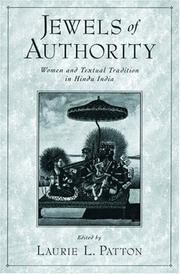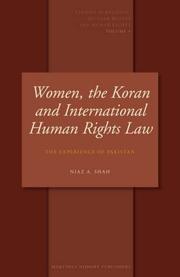| Listing 1 - 3 of 3 |
Sort by
|
Book
ISBN: 081304068X 9780813040684 0813039584 9780813039589 9780813033549 0813033543 9780813037301 0813037301 Year: 2009 Publisher: Gainesville : University Press of Florida,
Abstract | Keywords | Export | Availability | Bookmark
 Loading...
Loading...Choose an application
- Reference Manager
- EndNote
- RefWorks (Direct export to RefWorks)
There are numerous conflicts ensuing in the Middle East, but not all are being fought with rockets and rifles. While the Internet has proven invaluable to those who wish to uphold a patriarchal society and spread the message of Islamic fundamentalism, Muslim women have used the Web to build a transnational community intent on growing women's rights in the Middle East.<
Feminism -- Religious aspects -- Islam. --- Islamic fundamentalism. --- Muslim women. --- Women's rights -- Religious aspects -- Islam. --- Muslim women --- Islamic fundamentalism --- Feminism --- Women's rights --- Religious aspects --- Islam --- Islam.

ISBN: 1280834250 0195350642 9780195350647 9780195134780 0195134788 0195134788 0197739741 Year: 2002 Publisher: Oxford ; New York : Oxford University Press,
Abstract | Keywords | Export | Availability | Bookmark
 Loading...
Loading...Choose an application
- Reference Manager
- EndNote
- RefWorks (Direct export to RefWorks)
Contributors. Abbreviations. Introduction, Laurie L. Patton. Part II. Ancient Arguments. 1. The Housemistress at the Door: Vedic and Buddhist Perspectives on the Mendicant Encounter, Ellison Banks Findly. 2. Ritual Rights: The Gender Implications of Adhikara, Mary McGee. 3. Mantras and Miscarriage: Controlling Birth in the Late Vedic Period, Laurie L. Patton. Part II. Classical Arguments. 4. Giver or Given? Some Marriages in Kalidasa, Stephanie W. Jamison. 5. Om, the Vedas, and the Status of Women with Special Reference to Srivaisnavism, Katherine K. Young. 6. Casting Light on the Sounds of th
Women --- Hindu women --- Hinduism --- Women's rights --- Dowry --- Dos --- Husband and wife --- Marriage law --- Religions --- Brahmanism --- Women, Hindu --- Social conditions. --- History. --- Religious aspects --- Hinduism. --- Social aspects. --- Social conditions --- History --- Social aspects --- Women - India - Social conditions --- Hindu women - India - History --- Women - Religious aspects - Hinduism --- Hinduism - Social aspects --- Women's rights - Religious aspects - Hinduism --- Dowry - India - History

ISBN: 9004152377 9789004152373 9786611400316 1281400319 9047410173 9789047410171 Year: 2006 Volume: 4 Publisher: Leiden ; Boston : Martinus Nijhoff Publishers,
Abstract | Keywords | Export | Availability | Bookmark
 Loading...
Loading...Choose an application
- Reference Manager
- EndNote
- RefWorks (Direct export to RefWorks)
Religion plays a pivotal role in the way women are treated around the world, socially and legally. This book discusses three Islamic human rights approaches: secular, non-compatible, reconciliatory (compatible), and proposes a contextual interpretive approach. It is argued that the current gender discriminatory statutory Islamic laws in Islamic jurisdictions, based on the decontextualised interpretation of the Koran, can be reformed through Ijtihad : independent individual reasoning. It is claimed that the original intention of the Koran was to protect the rights of women and raise their status in society, not to relegate them to subordination. This Koranic intention and spirit may be recaptured through the proposed contextual interpretation which in fact means using an Islamic (or insider) strategy to achieve gender equality in Muslim states and greater compatibility with international human rights law. It discusses the negative impact of the so-called statutory Islamic laws of Pakistan on the enjoyment of women’s human rights and robustly challenges their Koranic foundation. While supporting the international human rights regime, this book highlights the challenges to its universality: feminism and cultural relativism. To achieve universal application, genuine voices from different cultures and groups must be accommodated. It is argued that the women’s human rights regime does not cover all issues of concern to women and has a weak implementation mechanism. The book argues for effective implementation procedures to turn women’s human rights into reality.
Women --- Women's rights --- Legal status, laws, etc. --- Legal status, laws, etc. (Islamic law) --- Religious aspects --- Islam. --- Women (Islamic law) --- Femmes --- Islam --- Droit --- Droits --- Droit islamique --- Aspect religieux --- Rights of women --- Human rights --- Islamic law --- Religious aspects&delete& --- Legal status, laws, etc --- Civil rights --- Law and legislation --- Women - Legal status, laws, etc. - Pakistan. --- Women's rights - Pakistan. --- Women - Legal status, laws, etc. (Islamic law) --- Women's rights - Religious aspects - Islam.
| Listing 1 - 3 of 3 |
Sort by
|

 Search
Search Feedback
Feedback About UniCat
About UniCat  Help
Help News
News